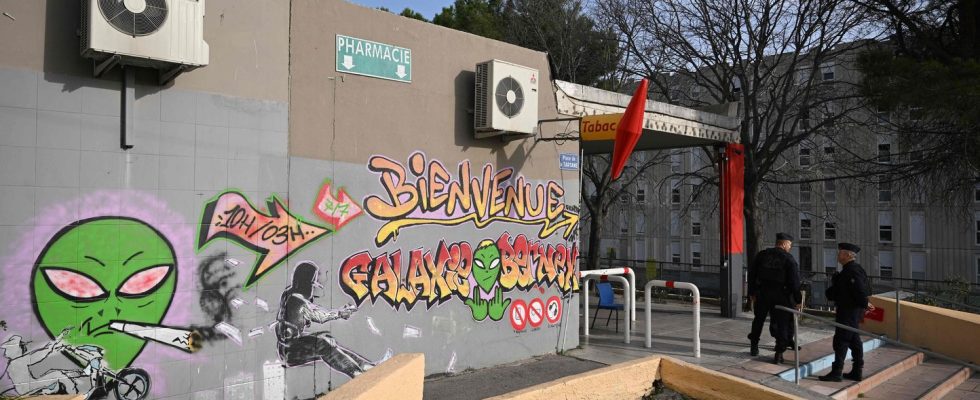Dozens of CRS trucks parked in front of the entrance to the city. This Monday, March 19, at the end of the morning, journalists arrived in large numbers at Castellane. The day after a large-scale police operation, Emmanuel Macron traveled in person to the northern districts of Marseille to hammer home his message: “the goal is to destroy the networks and the traffickers,” explains the president. of the Republic to a group of children, all filmed and broadcast live on continuous news channels.
“We are going to increase the in-depth work that has been done in recent years of harassment of deal points,” he declares alongside the new police prefect of Bouches-du-Rhône, Pierre-Edouard Colliex. In the Marseille city, 900 police officers, gendarmes and customs officers will be deployed for several weeks. And other “XXL net space” operations are launched across the territory.
Will the fear of being caught and the guilt-inducing messages deter southern consumers? “I haven’t been to buy any since the start of the “clear place” operations but I was just thinking of getting some this weekend,” confides to 20 minutes Chris*, in his thirties. On the other hand, there is no question of him moving to a deal point.
“Before, we went to Campagne-Lévêque, which was the least expensive and best served. A few years ago, there was a big period where there were police raids every week. It had become much less reliable as a plan. Since then, I have used delivery people whom I contact by message. There has never been a problem. So it’s not really going to change my habits. Since he also comes from a city, I just hope it will be operational. »
“It’s not going to change much”
According to Chris, these “clean place” operations will not “dissuade consumers” from buying cannabis in the neighborhoods. “It’s not going to change much. Even during confinement, people continued to go there to buy supplies. There is a large clientele. » And labor too. “There is no work in the neighborhoods. Of course, there are those who want to make lots of money from trafficking, but there are also those who get into it because of poverty and the lack of professional opportunities, the little hands,” recalls he.
What scares him the most are roadside screenings. And for good reason: Chris has already had his driving license revoked. “When I got arrested, it calmed me down. And then, I felt like injustice. I hadn’t smoked before getting behind the wheel and I didn’t have anything on me. That’s the difference with alcohol. Regardless of the rate, even if I wasn’t high, they considered me to be under the influence. »
A new wave of violence
This thirty-year-old from Marseille does not understand why the government attacks consumers so much. Cannabis users, he said, are not responsible for the settling of scores affecting the city, as affirmed the Minister of Justice, Éric Dupond-Moretti. “Drug trafficking generates so much money that it creates conflicts between rival teams and an outbreak of violence,” explains to 20 minutes a police source. And the “clearance” operations, whose results are “not fantastic”, risk, according to her, provoking new clashes. “They are arresting people and their points of sale will be taken over, it will not go well when they come out of prison. »
“What we observe in the scientific literature is that the degree of severity of laws regarding drug use has no impact on consumption levels,” analyzes Marie Jauffret -Roustide, sociologist and researcher at the center for the study of social movements at Inserm. “When a country is very repressive, as is the case with France, the number of consumers does not drop. On the contrary, our country has one of the highest levels of cannabis consumption in Europe. Conversely, Portugal, which has decriminalized the use of all drugs, has levels of cannabis use three to four times lower. »
A war that “does not reduce consumption”
Member of the scientific committee of the European Monitoring Center for Drugs and Drug Addiction, Marie Jauffret-Roustide believes that “these ‘clean cut’ operations can perhaps have an effect on the issue of trafficking.” But, she insists, “waging the war on drugs does not reduce consumption and causes other harm.” “This stigmatizes users, who will hide and will be less likely to turn to care and ask for help to stop using. »
According to the sociologist, “one of the problems we face in France is that we have an approach which is not sufficiently pragmatic on these questions and which is not based enough on data”. However, “policies based solely on a moralistic approach to drugs do not work”. “What is important is to invest money in prevention, the development of psychosocial skills among young people to ensure that their consumption levels can drop. In Canada, where they legalized cannabis for adults in 2019, they invested all the money earned in prevention campaigns. They have increased awareness of the risks associated with cannabis consumption in the general population. »
*The first name has been changed

